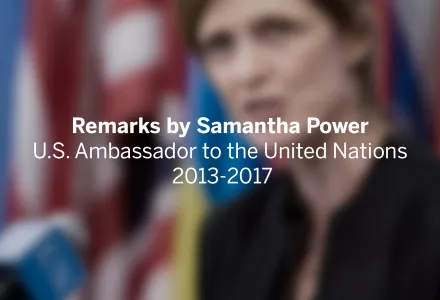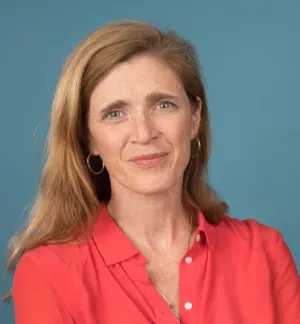
It’s wonderful to be here amongst so many of Stanley’s friends, colleagues, and students. I’d like to start by saying to Inge just that your partnership with Stanley and your romance with Stanley were an inspiration.
In a 1967 interview with The Crimson, Stanley said this about Cambridge: “The thing I miss here is beauty. There are too many buildings, and the weather is abominable. Since my youth in France, I’ve come to expect a warm ocean as a natural right, and I think no one has an excuse for living in New England. We professors who enjoy Mediterranean landscapes – and there are many of us – should petition Harvard to buy us a farm in southern France when we retire.”
Of course the truth is that when Stanley moved into the Center for European Studies, he carved out a little European alcove with natural light in the middle of all those buildings. He and Inge found their home in the waves in Rockport. But the irony of Stanley’s musing is that, while he savored beauty and lived with tremendous elegance wherever he was, he was never capable of retiring. He spent more than five decades teaching here – abominable weather notwithstanding. His restless mind raced until it could race no more – to deploy ideas to shape the messy world around him. And the childhood in France that Stanley alluded to was hardly that of a privileged child growing up by the seaside, but rather – as many have noted – an upbringing indelibly marked by the horrors of the Second World War.
Stanley was a historic figure in his life, and he will remain a historic figure for generations to come. He was a man whose worldview was steeped in history, and he was a man whose worldview has helped shape history. Others have sketched out the trajectory of his childhood – of being forced to flee Vienna, then Paris, and then Nice, along with his mother, always to escape the Nazis, who identified them as Jews. Stanley rarely talked about his upbringing. But when he did, he described spending countless nights awake as a small child, as he put it, “waiting for the bell to ring at 3 a.m.” – and for the Gestapo to take him and his mother away. “The fear never left us,” he said. The experience also impressed upon him, in his words, “the way in which public affairs take over private lives, in which individual fates are blown around like leaves in a storm once History strikes.”
In the spirit of Stanley’s always meticulous threesomes, I will speak to three of his many contributions over his oh so prolific life. A life shaped in no small part by his own history, and by his deep regard for human dignity and for man’s stubborn, recurrent insistence on trying to bend history’s arc.
First, Stanley was a mentor, of course. He used to say that he saw himself as a teacher first, and a writer second. It is hard to imagine a professor at this institution – or at any institution anywhere – having done more to shape the way his students saw the world than he did. It is telling that so many of the tributes published after Stanley’s passing – whether by journalists, academics, or policymakers – included a line in which the author acknowledged that he or she had been Stanley’s student.
Like most of us here, I’m a student shaped by the passion and reason of Stanley Hoffmann. Twenty years ago this very fall, I began law school here, fresh from having reported on the wars in the Balkans. I wandered about campus somewhat aimlessly, wondering how I could stick out Contracts and Torts when my heart was back in Bosnia. But my dear friend Gary Bass assured me that there was a cure for what ailed me, and his name was Stanley Hoffmann. Gary steered me to a crammed course taught jointly by Stanley and Father Bryan Hehir – who I think is here with us today. It was everything I had hoped Harvard would be: principled, informed, and often completely hilarious. I had read Stanley’s searing critiques of the international community’s failure to stop the atrocities in Bosnia from the field – and he had articulated so eloquently the frustration I felt there as an observer. Now his course challenged me and all of us to develop a historical and normative framework in which to lodge our intuitions. But Stanley also, really for the first time, prodded me and others to “think like a State” – if only to know what we were up against.
Stanley and Father Hehir assigned the class a final 20-page term paper at the end of the semester, which I focused on why the U.S. government had repeatedly failed to take steps to stop genocide. My 20 pages quickly became 50 and then 70. And I realized sitting in Stanley’s magnificent, cozy office – an office, too, exactly as I had imagined every Harvard professor’s would be, with every surface piled high with books in multiple languages – it was then that we realized together that a book on this subject didn’t exist and that it might be useful if it did. So that 70 page paper, six long years later – and many meetings and counseling sessions and therapy sessions with Stanley later – a book, “A Problem from Hell,” came into existence. As every speaker before me has set out, and as so many of us here gathered know – Stanley played this role for so many of his students. And it is hard to imagine how many books would never have been written, or how many people would never have thought to pursue careers in diplomacy or international affairs or academia, had it not been for the time and encouragement we got from Stanley. “Why not?” he would ask, making more seem possible than was objectively warranted most of the time.
My second point is that Stanley Hoffmann didn’t just inspire us to care and to learn; he taught us a particular mode of thinking. In describing his intellectual processes, he once wrote of himself, “I tend naturally to ‘think against.’” An anti-utopian and anti-ideologue, he methodically set about debunking theories on all sides. He didn’t browbeat. He asked questions. He prodded. He chipped away. And the quality that made Stanley’s dissections particularly persuasive was his ability to meet his sparring partners where they were – whether that individual was a breathless student, a fellow academic, a government bureaucrat, or a foreign policy heavyweight. Consider his public debate fifty years ago on this campus with Daniel Ellsberg – then a special assistant in the Defense Department – on whether the United States should stay in Vietnam. Rather than make a moral or historical argument for U.S. withdrawal – as many, including Ellsberg, expected – Stanley instead took on faith the U.S.’s stated objectives in Vietnam and asked if they were actually attainable. It was a tactic Ellsberg conceded, speaking to The Crimson immediately after the debate, was as he put it, “very disarming.” As Stanley later said, “I thought that with somebody like [Ellsberg] – an economist by training, and training in game theory – moral arguments wouldn’t have [made for] a dialogue. I preferred to meet with him on his own ground.”
That’s what Stanley did – he met you on your own ground. And in so doing, he helped you see the ground beneath your feet differently. The effect on Ellsberg – as on so many of us – was transformative. Ellsberg would start writing to Stanley months later, when he was in Vietnam, as he continued to mull over many of the arguments Stanley had planted in their debate. It is not unreasonable to think that Ellsberg may have taken a different path if he had debated a different man in Cambridge in 1965.
Third, Stanley insisted that any discussion, any theory, any writing, or any other intellectual pursuit keep in the foreground its impact on real people. “Don’t forget the human significance – the impact on human beings – of the recommendations you may offer,” he advised students and fellow academics – advice that serves very well also for public servants. Surely, this was rooted in his own experience of concepts and policies translating into life or death for people; of him being, in his words, one of the individual leaves blown about most vigorously by the winds of History. That also explains why Stanley always grounded his work in the inherent messiness and complexity of the world. Contrasting his approach with that of a fellow academic, he once wrote: “His line goes from a scrutiny of existing or generally accepted norms, to his view of the ‘ought,’ to the ‘is’…My way is the opposite, starting from what ‘is’ and groping toward the ‘ought.’”
This combination – of seeing the world as it is, with all of its violence and suffering; while at the same time being mindful of the human consequences of policies – in others might have led to deep cynicism or even hopelessness. But as others have said, certainly not in Stanley. He not only rejected the idea that effective statecraft and morality lived on opposite ends of the spectrum; he was constantly seeking the path – narrow, very, very narrow though he knew it was – by which effective statecraft could be ethical. So while he conceded that utopians and idealists “tempt me into demonstrating (gleefully) that their recipes are worthless,” he also said, “Crass realists provoke me into trying to show that they have overlooked some exits.” Finding those exits was, for Stanley, a life’s search.
One could go on at length about Stanley’s prescriptions that proved uncannily prescient – on Vietnam, on Middle East Peace, on Iraq; his batting average was superb. Yet the most important area in which his wisdom has proven enduring, I think, has been in changing the way we understand the relationship between foreign policy and its impact on real people. Stanley opened one of his nineteen books with a quote from the great Albert Hirschman, who envisaged a world “where moral considerations need no longer be smuggled in surreptitiously, nor expressed unconsciously.” Hirschman was writing about social science, but Stanley had a similar vision for statecraft.
Stanley Hoffmann did as much as anyone to create a world in which consideration of what is right no longer need to be smuggled in through the back door of foreign policy discussions. He did as much as anyone to push back against the idea that smart statecraft is necessarily devoid of considering the impacts on real people. Stanley’s ideas matter. They will continue to matter. He restored human beings and human welfare to an equation that they never should have been cut out of. And even in this time of growing isolationist sentiment – that would have caused him to throw various objects at the television, were he with us – you see these ideas reflected in the way more and more policymakers think about our role in the world. And that is one part of his tremendous legacy.
Let me conclude. In a 1972 review of a documentary about the Nazi occupation of France, Stanley told the story of his history teacher in Nice, who forged the documents that he and his mother used to make their way to the small town where they had less of a chance of being caught by the Gestapo. It was what he called the “basic decency” of that teacher, and of the small town residents who hid him and his mother for the rest of the occupation, that saved their lives. And it was in those individuals that he found evidence of what Camus – who Stanley was so fond of quoting – wrote in The Plague: “There are more things to admire in men than to despise.” Stanley not only held onto that hope, but he found a way to embed it into the way that he taught, the way that he thought, and the way he taught nations to rethink the way they related to one another and to their people. We are all better off for it. We are all better off, as he put it, “grasping the possibilities of improvement without illusions.”
Thank you.
###
Power, Samantha. “Remarks by Ambassador Samantha Power on the Legacy of Stanley Hoffmann: Grasping the Possibilities of Improvement, Without Illusions.” December 3, 2015


